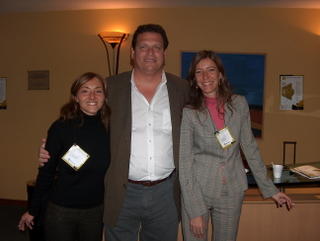
The 4th Translation and Interpretation Conference just ended in Córdoba in Argentina. The event was organized by Cecilia Maldonado (left) and Cecilia Irós (right), owners of
IMTT, a translation and interpretation services company in that city.
The superbly organized event covered several issues of interest for freelance translator, ranging from productivity tools to language issues.
On Sunday night, Proz organized a
Pow-Wow, which was apparently one of the biggest ever. There were almost 100 translators at the San Honorato Restaurant. Great food, great people, great conversations. Each person had a chance to introduce himself or herself (mostly women... as usual).

The good surprise of this event was finding other very professional organizations in this city, which, by the way, has the oldest university of the Americas. Companies like
SpanishBackOffice, owned by New Zealander Charles Campbell,
Spanish Express of Carlos Rivarola, and
Patagonia Translations owned by my friend Ignacio Luque (who was kind enough to refer me to the organizers as a speaker) are also offering professional services to translation companies and final clients worldwide.
My greatest take away from this event was the idea that came up in discussions about competition in the market. I believe that translation companies in Argentina should get together and pool resources to start selling Argentina as the best place for Spanish translations. What Argentineans don't see is that Panamenians, Mexicans, and Peruvians, for example, are getting the same price for their translations, even though as a general rule Argentineans are better educated and more prepared. I suggest that Argentineans get together and set up booths at Localization World, ATA Conference, the ATC Conference in London, and others. Their goals should be to promote Rosario, Córdoba, and Buenos Aires as the places to go for professional Spanish translations. Let's see who will take the lead.


